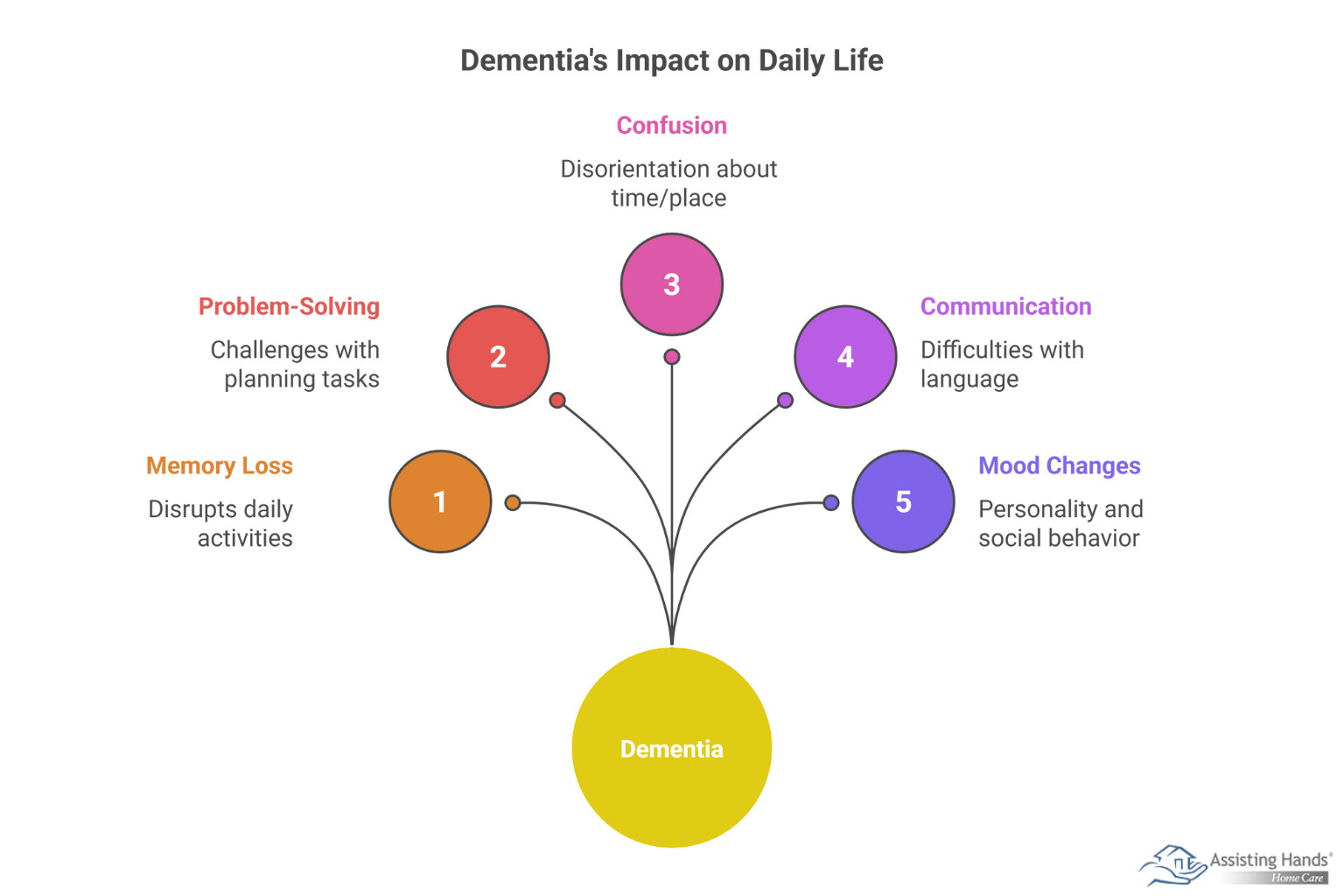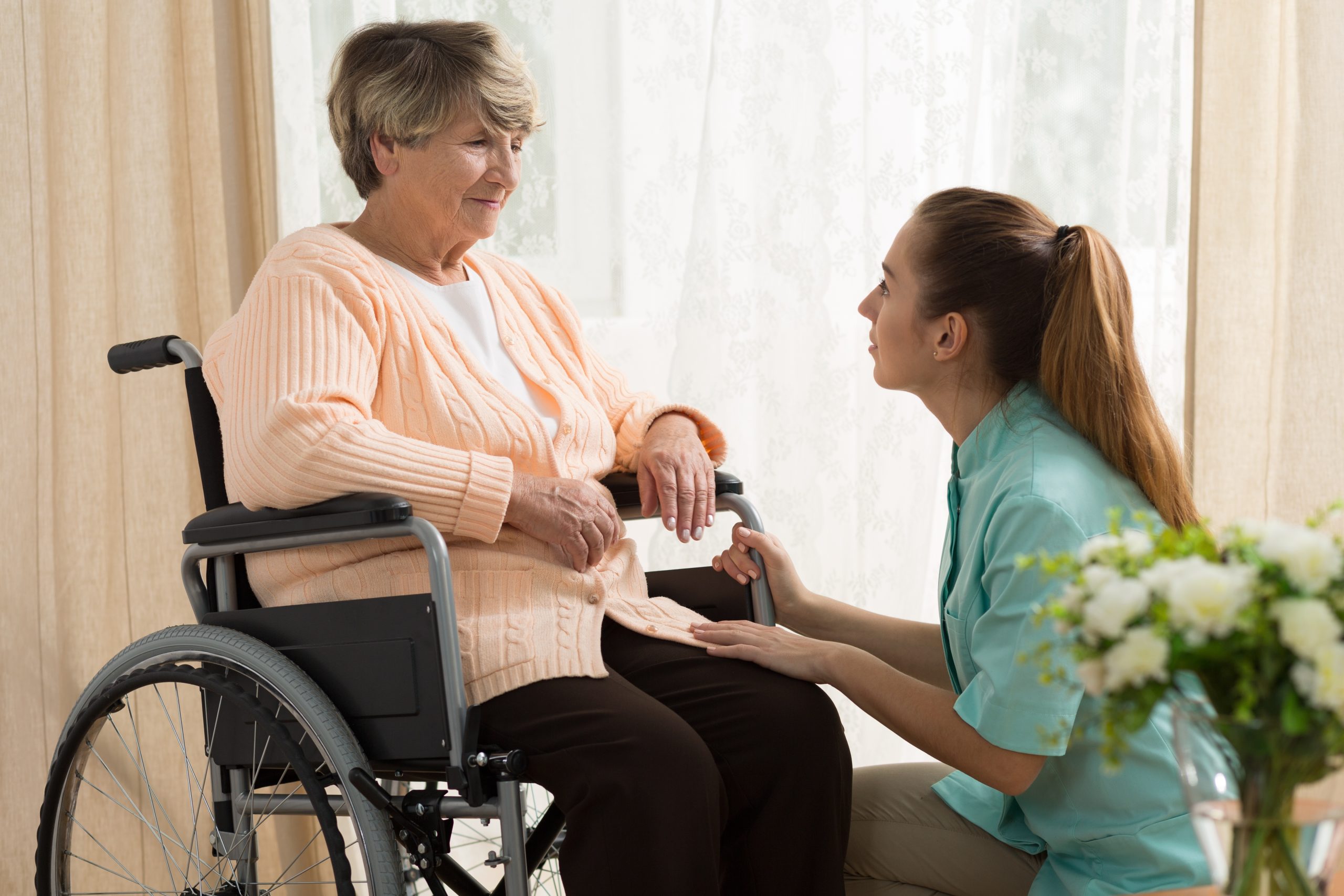
Table of Content
Recognizing dementia symptoms early can make a significant difference in care planning and quality of life for your senior loved one. While occasional forgetfulness is normal with aging, certain warning signs may indicate the onset of dementia or Alzheimer’s disease.
Memory Loss that Disrupts Daily Life
Memory changes are often the first noticeable sign of dementia, but they go beyond typical age-related forgetfulness. Watch for these specific indicators:
- Forgetting recently learned information – Repeatedly asking the same questions or forgetting important dates and events
- Relying heavily on memory aids – An increased dependence on notes, reminders, or family members for tasks your loved one previously handled independently
- Difficulty retaining new information – Difficulty remembering conversations that happened just hours or days earlier
- Losing track of important items – Frequently misplacing keys, glasses, or other everyday objects in unusual places
The key difference is that these memory lapses interfere with normal activities and don’t resolve with reminders or prompting.

Challenges with Problem-Solving and Planning
Dementia affects executive function, making it harder to work with numbers, follow plans, or concentrate on familiar tasks. Common signs include:
- Trouble managing finances – Difficulty balancing checkbooks, paying bills on time, or making financial decisions
- Changes in cooking abilities – Following familiar recipes becomes challenging, or your loved one may forget steps in meal preparation.
- Difficulty with multistep tasks – Trouble completing activities that involve several steps, like getting dressed or using appliances
- Poor judgment in decision-making – Making unusual choices about money, personal care, or social situations
These changes often become apparent when your loved one can no longer handle responsibilities he or she has managed for years.
Dementia can also affect the ability to perform daily chores independently, and you may need to hire a dedicated caregiver to help your loved one manage these tasks. If your senior loved one has been diagnosed with a serious condition and needs help with tasks like meal prep, transportation, bathing, and grooming, reach out to Assisting Hands Home Care, a leading provider of senior home care families can trust. We also offer comprehensive care for seniors with dementia, Alzheimer’s, and Parkinson’s.
Confusion about Time and Place
Disorientation is a hallmark symptom that can be particularly distressing for both seniors and caregivers. Watch for:
- Losing track of dates and seasons – Confusion about what day, month, or year it is
- Forgetting where they are – Becoming lost in familiar neighborhoods or not recognizing their own homes
- Difficulty understanding time passage – Not remembering how they arrived somewhere or confusion about recent versus past events
- Trouble with spatial relationships – Problems judging distance, which may affect driving or navigating stairs
This disorientation often worsens during evening hours, a phenomenon known as “sundowning.”
Language and Communication Difficulties
Changes in communication abilities can signal cognitive decline. These may manifest as:
- Word-finding problems – Difficulty remembering common words or calling things by the wrong names
- Following or joining conversations becomes difficult – Losing track of discussions or repeating themselves frequently
- Writing challenges – Changes in handwriting or difficulty expressing thoughts in writing
- Reading comprehension issues – Having trouble following written instructions or understanding written material
Your loved one might also withdraw from social activities due to embarrassment about communication challenges.
There’s no known cure for dementia at the moment, but seniors can delay the onset of this condition by making healthy lifestyle choices. If you have a senior loved one who needs help maintaining a high quality of life while aging in place, reach out to Assisting Hands Home Care, a leading provider of at-home care Arlington families can trust. Our caregivers help seniors focus on healthy lifestyle habits such as eating nutritious foods, exercising regularly, and maintaining strong social ties, and we offer mentally stimulating activities that can boost cognitive health and delay the onset of dementia.
Changes in Mood, Personality, and Social Behavior
Dementia can alter personality and behavior patterns, sometimes dramatically. Key changes include:
- Increased anxiety or depression – Feeling scared, worried, or sad more frequently than usual
- Social withdrawal – Losing interest in hobbies, social activities, or spending time with family and friends
- Personality shifts – Becoming more suspicious, irritable, or aggressive when these weren’t typical traits
- Poor judgment in social situations – Inappropriate comments, lack of personal hygiene awareness, or changes in dress and grooming habits
These behavioral changes can be among the most challenging aspects for families to navigate and often signal the need for professional evaluation.
If you notice several of these signs in your loved one, consider scheduling an appointment with his or her healthcare provider. Early detection allows for better care planning, access to treatments that may slow progression, and more time to make important decisions about future care needs.
Aging in place can present a few challenges for seniors living with dementia. However, they can still live independently at home with the help of professional dementia care. Arlington families can rely on Assisting Hands Home Care to provide their elderly loved ones with mental and social stimulation, timely medication reminders, assistance with meal prep, and much more. Our caregivers are available around the clock to help your loved one live a happier and healthier life. Call one of our friendly Care Specialists today to learn more about our customized care plans.






